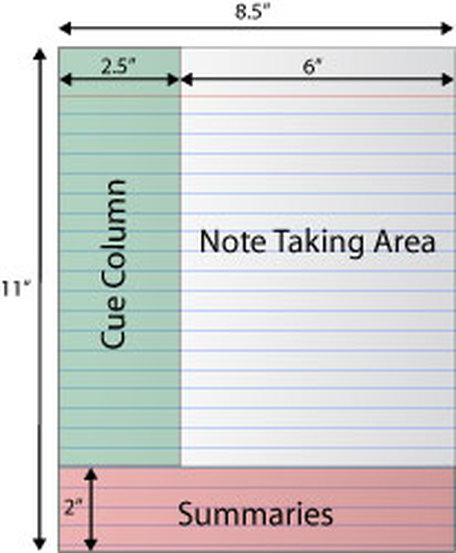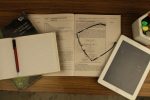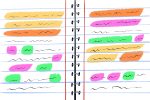The first step to doing well in school is relatively simple: You need to have the right study materials.
In order to ensure that you have the best possible starting point for your studying, it’s essential to take comprehensive notes in class. However, you won’t necessarily be better off just by copying down everything that your professor says word for word—in fact, you’ll probably end up getting behind and missing important information.
Instead, put a little bit of effort into sharpening your note-taking skills and strategies. The more thoughtful and organized your notes, the better your chances of boosting your GPA.
1. Prepare Ahead of Time
Being able to take helpful notes will require you to do some work before you get to class. If you have reading for a certain day, try to complete it early and make note of the concepts that you don’t understand. This way, during your lecture, you’ll know what to focus on. If your professor posts slides or outlines that you can access before class, go through them and get sense of what you do and don’t know.
Rather than writing everything during class, including the ideas that already make sense to you, you can spend your time taking more in-depth notes on concepts that remain unclear. Writing out some questions that you have after reading is also helpful, as you can then jot down the answers when your professor addresses them—and, at the end of class, if there are any questions left that haven’t been resolved, you know exactly what to ask your professor.
2. Make Up Your Own Code
To ensure that you don’t get behind and miss important information during lectures, come up with a set of abbreviations that you can employ to shorten commonly used words. Whether they’re conventional, such as “w/o” for “without,” or your own unique version of shorthand, you’ll save a lot of time.
Make sure, however, that you’re consistent and will be able to understand what you wrote when you look back on your notes—they won’t be any help if you end up unable to decipher your abbreviations. Once you can write down material more quickly, it will be easier for you to listen your professor and absorb the lecture. You’ll also have the chance to take more structured notes, which will make them simpler to look back on and read through.
3. Stay Organized
When you’re starting off on a fresh page in your notebook, stay organized by writing out the date of each meeting at the top of the page. That way, you can easily find your notes if you need to look back on the lecture for a specific day, and, if you have regular assigned reading on your syllabus, you can flip through your notebook to match up the corresponding notes. Label the beginning of each section by topic as well, in case you need to go back and review a specific concept. Instead of wasting energy skimming through pages of notes, you’ll find what you need right away.
One of the easiest ways to make your notes look neat and organized when you go back to study is by color coordinating them. Use different colors for key terms, definitions, questions and explanations. Highlight concepts that your professor repeats more than once or emphasizes so that you can easily find them when you’re studying and to ensure that you won’t miss anything when you’re reviewing. Write down questions or confusing points in red so they stand out and you can address them after class. Like with abbreviations, try to be consistent with the significance of each color, as this will prevent confusion when you’re studying.
4. Use a Note-Taking Method
To think that writing down everything that your professor says makes for good note-taking is a big mistake. While the ideal method differs from person to person, in general, students are more engaged if they use a specific note-taking strategy. For instance, the Cornell Method is a great way to take organized notes while thinking about the material that you’re learning.
Prepare by dividing your notebook paper into three sections; leave one small margin on the left-hand side of the page and about five or six lines at the bottom of the paper. Use the section on the right to take write down information during class and then jot down main concepts on the left as you go. Later, review your notes and summarize the major points on each page in a couple of sentences at the bottom. In addition to forcing you to review right away, the Cornell Method will also make your studying much easier when it comes time for exams. While it may require more effort initially to organize everything, you’ll save time later on when you start studying.

Another option for more visual learners is the Mapping Method. This strategy entails drawing out the connections between key concepts as you hear them, so that you can see and better understand how everything relates to each other. You’ll also be required to stay focused during class, as you’ll be listening for connections that can tell you how to structure your map. When you go back later to study, review by fleshing out these relationships even further. You can also rework the relationships and connections while you study, given that you’ll have a more complete idea of what you need to know.
While taking comprehensive and efficient notes may require you to devote more time to preparation and will definitely force you to pay more attention during class, it will make your studying a lot easier. In addition to having good materials to work from, written in a way that you understand best, taking effective notes will require you to actively engage with what you’re learning as you go; in other words, you’ll be starting off with an idea already of what you do and don’t know. Regardless of your preferences, choose one strategy that works well for you and stick to it; the sooner you improve your note-taking strategies, the sooner you can start to improve your grades.














